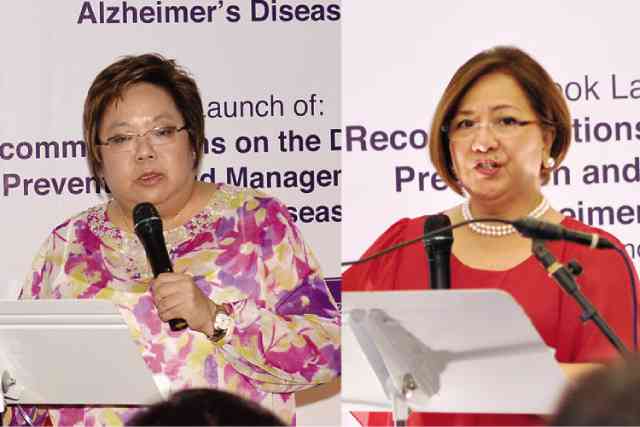Updated book tackles Alzheimer’s issues and treatments

DR. GRACE Orteza (left), book convenor and member of Adap board of directors, and Adap president Dr. Socorro Martinez speak during the launch of “Recommendations on the Diagnosis, Prevention and Management of Alzheimer’s Disease (2nd edition)”
The new edition of a book on Alzheimer’s disease published by a medical advocate group takes on its ethical, legal and psychosocial issues; and advances in pathological researches and pharma- and nonpharmacological treatments.
In a media briefing last Sept. 22 at Fully Booked BGC, Alzheimer’s Disease Association of the Philippines (Adap) launched the second edition of the “Recommendations on Diagnosis, Prevention and Management of Alzheimer’s Disease,” complementing the first edition it published in 2005 which was “used as a reference by Filipino physicians in caring for their patients,” according to Dr. Grace Orteza, book convenor and member of Adap board of directors.
Gradual loss
Alzheimer’s disease (AD) is one of several debilitating disorders that cause the gradual loss of brain cells. It is the most common type of dementia, a collective name for progressive degenerative brain syndromes, which affect memory, thinking, behavior and emotions. The World Health Organization revealed that 35.6 million people worldwide have dementia, with 7.7 million new cases every year. Currently, there is no cure for most types of dementia, but treatments, advice and support are available.
Adap, a nonprofit organization composed of persons with dementia and their family caregivers, doctors with special interest in dementia, allied medical professionals and others involved in the care of patients, and A. Menarini Philippines, local affiliate of biopharmaceutical company Menarini Group, launched the book in commemoration of World Alzheimer’s Day last Sept. 21.
Since “there was an outpouring of new evidences and information, especially in understanding the pathology of AD, the emergence of new research criteria for the diagnosis of AD and its prevention,” Adap president Dr. Socorro Martinez said they saw the need to incorporate new, timely and relevant data in the second edition of the book.
“Recommendations on Diagnosis, Prevention and Management of Alzheimer’s Disease” contains updated and new information, according to Orteza, dealing on the behavioral and psychological symptoms of dementia; advances in researches on AD, especially on its pathology; focus on nonpharmacological types of treatments; and legal, ethical and psychosocial issues confronting AD patients and their families.
Updates
The book’s updated Chapters 3 and 4 tackle recommendations on the diagnosis and prevention of AD, respectively. Diagnosis of AD now includes preclinical, prodromal and dementia stages, said Orteza, since “studies have proved that changes in the brain starts 10-20 years earlier. AD patients may have the disease in their 70s, but the changes in the brain manifest when they’re still 45 to 50, though not noticeable.” On the other hand, Orteza said prevention “became the focus of research in AD in the recent five years because various treatments and methods, from immunization to use of cancer drugs, to cure the disease or modify its course were dismal failures.” The same chapters also lengthened the discussion on locally available, culturally sensitive, nonpharmacological interventions specifically for behavioral and psychiatric symptoms of AD, Orteza added.
Meanwhile, new chapters 5 to 7 take on the pharmacological management of cognitive and functional impairments in AD; NPTs for cognitive and functional impairments in AD; and the management of behavioral and psychological symptoms of AD, respectively.
Seeing the need to face these “issues which are neglected but are still important,” Chapter 8 tackles the ethical, legal and psychosocial issues in AD care, including ethical dilemmas, psychosocial and legal issues in its different stages like advance directives and end-of-life care, Orteza said.














